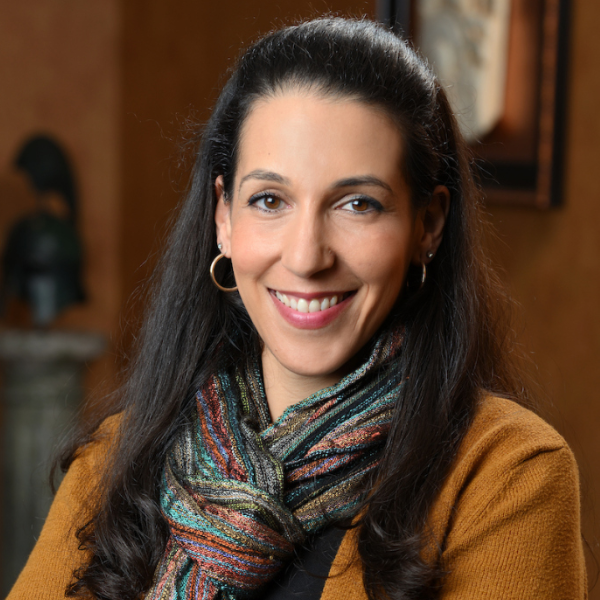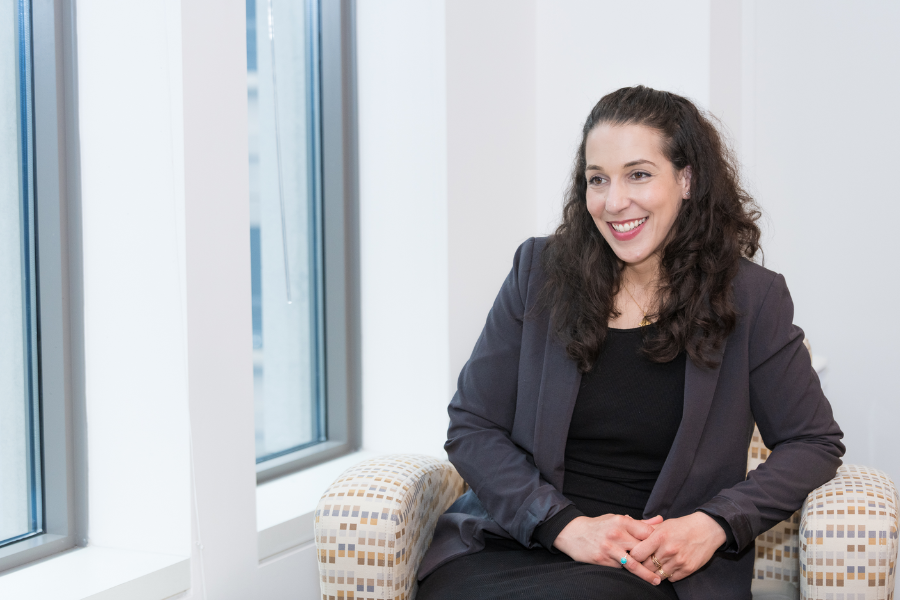First 1964 Project Hire Nadia Abuelezam Brings New Research Focus to MENA Populations
October 31, 2024
In 1964, Congress passed the Civil Rights Act, putting a legal end to segregation in businesses and schools, and banning discriminatory practices based on race, color, religion, sex, or national origin. That same year, Michigan State University College of Human Medicine was established as the first medical school accredited as a community-based medical school and designed to educate physicians who would meet the needs of all people—particularly those from underserved communities.
As part of the college’s Strategic Plan, last year Aron Sousa, MD, dean of the medical school, launched the 1964 Project. It provides funding specifically for new or existing faculty whose work advances scholarship in justice, inclusion, equity, and diversity in the field of medicine.
Julie Phillips, MD, MPH, is excited to have the college’s first 1964 Project faculty member in her department. As chair of the Department of Family Medicine, Phillips said the dean’s initiative got her thinking about hiring a faculty member who could help address what she saw as a gap in her department’s work—research and care focused on people of Middle Eastern and North African (MENA) descent.
“This particular population is not very well recognized, and often not counted in ways that are important and that have a downstream impact,” Phillips said.
 On October 1, Nadia N. Abuelezam, ScD, joined the college as associate professor of Family Medicine, becoming the first hire under the 1964 Project. Abuelezam is also part of the university’s 1855 Professor cohort.
On October 1, Nadia N. Abuelezam, ScD, joined the college as associate professor of Family Medicine, becoming the first hire under the 1964 Project. Abuelezam is also part of the university’s 1855 Professor cohort.
“The thing about Nadia that was striking to me was that she was already perfectly doing the job that I had envisioned, which was to be a researcher who was really focused on this population and on health equity,” said Phillips. “It was a unique experience—it felt magical to have it work out so well.”
Abuelezam, who comes to MSU after serving as an epidemiologist and associate professor at Boston College’s Connell School of Nursing, has spent her career focused on understanding inequities in health outcomes and health care access—particularly among MENA populations.
“It’s very, very rare to see a position that was written in such a thoughtful, proactive way,” said Abuelezam. She noted that Phillips’ posting for the role was published well before the Biden administration approved a change to the U.S. census earlier this year, which will allow “Middle Eastern or North African” to be included as an option under the race and ethnicity section for the first time in history.
“The institution was saying, ‘Hey, we care about this population. We want this population to be named. We want to have institutional support for someone to do work with this population that has previously been ignored or shuffled into another group,’” said Abuelezam. “So from my perspective, to see a position which had such strong institutional support was an indication of [MSU’s] commitment to true health equity.”
During the 2020 census, more than 310,000 people living in Michigan used the form’s write-in option to report MENA origins. Outside of such options, MENA populations have been “lumped into the white racial category in the United States,” said Abuelezam.
“And so what happens is that we have not had a way to establish the health needs of this population. From an epidemiological perspective, we don’t have a lot of the statistics we need to make good inferences—what are the starkest needs in this population? Without proper accounting, we actually can never reach health equity.”
Abuelezam added that her new role at the College of Human Medicine is an opportunity to reinforce the idea that “there is no health equity without MENA, and MENA also contributes to larger health equity questions.”
"I see MSU as being at the forefront of the institutional support for work in this area, which has the potential to answer some really important health questions."
Prior to coming to MSU, Abuelezam had already begun working on some of these questions with the Arab Community Center for Economic and Social Services, also known as ACCESS. According to the group, they’re the most comprehensive Arab American community nonprofit in the U.S., with headquarters in southeast Michigan.
Phillips said having the perspective of ACCESS members was important to her when interviewing candidates for the position.
“We had ACCESS representation on the search committee, which was something we had never done—to have a community partner be that connected to the search for a faculty member,” said Phillips. “But I wanted to bring in someone who would work with them closely. And when Nadia came in, I didn’t need to introduce her, because she already knew them. She was already working with them.”
 “ACCESS is very near and dear to my heart,” said Abuelezam. “To hear that the university was really supportive of that connection was quite refreshing, and ideal in a place where you have so many students, patients, and community members from this group. It was really meaningful to me.”
“ACCESS is very near and dear to my heart,” said Abuelezam. “To hear that the university was really supportive of that connection was quite refreshing, and ideal in a place where you have so many students, patients, and community members from this group. It was really meaningful to me.”
Michigan is home to the most MENA residents relative to state population nationwide, and this is particularly true in Dearborn, where more than half of the city’s residents report MENA ancestry.
Phillips said Abuelezam will be guiding her own research path, but that it will begin by establishing the barriers to health that the MENA community has experienced and understanding their needs.
“There’s truly a lifetime of work to be done there,” said Phillips.
To promote future research and care in MENA populations, Abuelezam is looking forward to finding ways to include students in her work.
“I think it’s important for our MENA students to know that the institution is invested in them in some small way,” she said. “I think that means a lot for our medical students who might be interested in doing this work. If I were a student at an institution and I knew that the institution cared that much about this population, it would go a long way for me.”
Phillips said it’s clear that this one 1964 Project position is opening the Department of Family Medicine to a wide range of possibilities when it comes to the MENA community.
“I see it not just as one person, but as a way we can continue to grow,” said Phillips. “There’s a high potential for us to really be a research center, and this one step is going to develop.
“The College of Human Medicine’s strength has always been our communities — we were founded by the communities in Michigan,” she said. “So, this is a very strong fit with what we’re already doing, and what we’ve historically done well.”
By Lisa L. Hayes
Photos courtesy of Michael Manning

